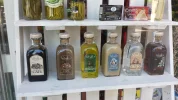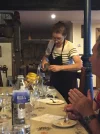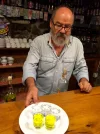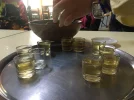So after 2 Camino's and having watched the movie "The Way" for the 12 thousandth time. A fellow pilgrim at a meet-up asked if I liked Orujo, and ridiculous to me I had never heard of it. I didn't understand Joost from Amsterdam when he introduced it in the movie.
Furthermore, This pilgrim told me that the best Orujo is the homemade kind you buy from the locals.
SO...
I'm curious how many of of you have that experience with Orujo, and if you know a good place or two that I can try it on my upcoming walk-a-bout.
Many thanks, Cheers!
Love the stuff - drinking, or stripping paint!
Wikipedia says that is pomace brandy, made from fermenting skins and seeds left over from the wine making process.
Gather that the pomace brandy can be made into a number of products in the orujo family - saw a range in a window in Estella (CF Sept 2018).
Came to know l
icor de heirbos in Melide CF 2017, was introduced to
orujo blanco in Ronccesvalle CF 2018, and then found
licor de cafe .... Gather
crema de licor is similar to Baileys Irish Cream
, licor de cafe is similar to Kahluha.
licor de cafe became my favourite tipple...
Did see
licor de heirbos for sale in Villafranca shop in a 3 litre plastic bottle for less than 20 euro!

And for the really dedicated orujo drinkers/sippers/skullers:
Orujo Festival
The Orujo Festival is one of the most traditional festivals celebrated in Cantabria; it has been running now for more than twenty years. It was first celebrated in 1984 and since then, thousands of people travel every year to this village in the north of Spain to participate in the celebrations.
Orujo originates from the region of Liébana and is mentioned in Middle Age documents found in the monasteries of the region. This festival celebrates not only the liquor, but the importance of this spiritual drink, which was once used as currency.
During the Orujo Festival visitors can enjoy watching Orujo being distilled before sampling it on the streets of the town. Visitors have the oppourtunity to taste the different varieties from the local cellars and discover other well-known dishes, such as “cocido lebaniego”, a special chickpea stew from the Liébana region; traditional gastronomic products, such as Picón Cheese; and desserts, such as “borono”, which is similar to black pudding. Musical shows and folkloric performances complete the activities program of this festival.
(refer
https://visiteurope.com/en/experience/orujo-festival/)




























